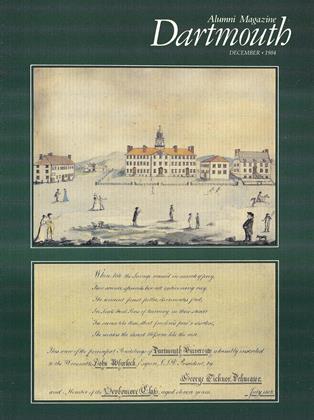"Your invitation to be with you tonight is the greatest honor in my life." Thus began an address by Professor of Biography and Japanese Studies Emeritus Donald Bartlett '24 on the occasion of the 20th anniversary of the founding of a Japanese organization to promote understanding of Americans and American culture. Bartlett played a key role in the formation of the American Studies Foundation of Japan, as described by another. speaker at the organization's 20th anniversary celebration in Tokyo. Minora Tabuchi, trustee of the foundation, explained that "the origins of the American Studies Foundation began with an encounter between a Japanese industrialist desirous of learning about America and an American professor desirous of informing about America."
The roots of the foundation were in a visit paid to Bartlett's Norwich home in February 1951, when Japan was still under occupation, by the late Takejiro Shindo, vice president of a Japanese corporation, and his assistant, Tabuchi. Ta-buchi, as a boy, had known Bartlett's mother when she and her husband were Congregational missionaries in Japan. Bartlett spoke at the 20th anniversary about the good feelings that arose between the Japanese visitors and the Bartlett family (which included Bartlett, his wife, his then 80 year old mother, and a younger sister, a physician). He recalled the visitors' appreciation for the entire Bartlett family's driving to White River Junction in a snowstorm to meet their train; Shindo's enjoyment of the snow squeaking underfoot, as in his boyhood home; the "regular shimbok'kai" (happy hour) around the fireplace. Eight or nine years later, Bartlett was appointed cultural attache to the American Embassy in Tokyo and he learned of a $243,000 U.S. Department of State grant available to the first foundation set up in a foreign country to support American Studies. The stage was set for practical realization of those good feelings engendered in 1951. "I asked Mr. Shindo the next time we met," explained Bartlett, "if he thought that his friends and associates in the Japanese business world believed that it would be valuable for Japan to become better acquainted with American institutions, our principles, our virtues, our faults and how we try to deal with our faults, and the habits of thought peculiar to us." Shindo's positive response, Tabuchi's assistance in supplying initiative to the effort, and Bartlett's efforts from his embassy post combined to elicit considerable financial support for the venture from the Japanese business community, in addition to earning the foundation the State Department grant. But Bartlett emphasized that the U.S. grant "by no means makes this a joint or binational enterprise. This is a Japanese foundation, and it is in acknowledgement of that fact that the gift was made."
Bartlett was born in Japan, and he speaks Japanese fluently. His 40 years on the Dartmouth faculty from 1927 to 1967 were interspersed with several stays in Japan, including his stint as cultural attache. His recent return to the country for the 20th anniversary of the foundation he helped found was an affirmation of what he called "a tradition, now at least 20 years old, of securing peace by using good sense." Bartlett's concluding remarks looked to the future: "In a time when trade reltions between Japan and the United States are tense, in a world where we all live in terror of foolishness in high places, where the means of uncontrollable destruction lurk in every capital," he said, "this constructive enterprise in understanding truly represents the kind of hope that all mankind must cherish." Tabuchi agreed, saying that upon the inauguration of the American Studies Foundation, "the most delighted ones of all were Mr. Shindo and Mr. Bartlett. The work of the foundation is a modest yet difficult task. . . . An effort to further solidify the base built by our elders is a necessity."
 View Full Issue
View Full Issue
More From This Issue
-
 Feature
FeatureThe College Today
December 1984 -
 Cover Story
Cover StoryDartmouth Hall (1784-1984) A Bicentennial Tribute
December 1984 By Charlotte K. Younger -
 Feature
FeatureChronicling the DOC
December 1984 By David O. Hooke '84 -
 Feature
FeatureHanover's Bests
December 1984 -
 Article
ArticleLover of parades
December 1984 By Peggy Sadler -
 Class Notes
Class Notes1940
December 1984 By Richard J. Goulder
Article
-
 Article
ArticleNOMINATIONS FOR ALUMNI TRUSTEE
April, 1912 -
 Article
ArticleAlumni Club Luncheons
March 1949 -
 Article
Article1949 Alumni Fund
April 1949 -
 Article
ArticleWith Big Green Teams
March 1957 By CLIFF JORDAN '45 -
 Article
ArticleRugby
November 1959 By CLIFF JORDAN '45 -
 Article
ArticleA FRESHMAN'S EXPERIENCE
DECEMBER 1929 By Professor Edwin J. Bartlett


